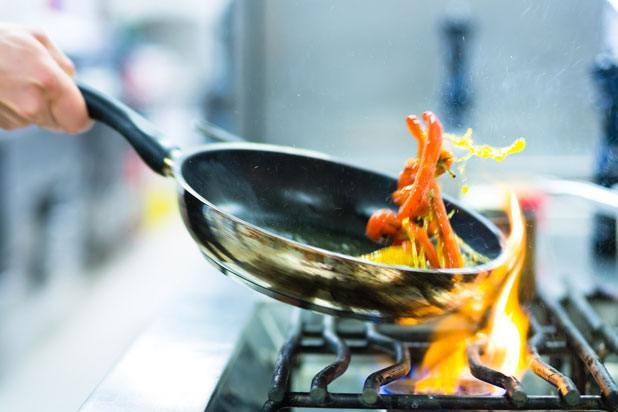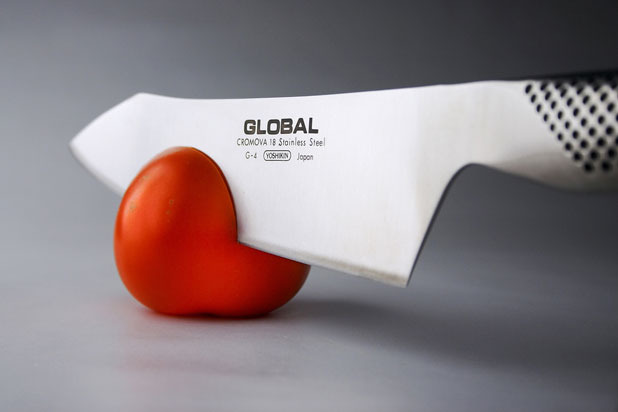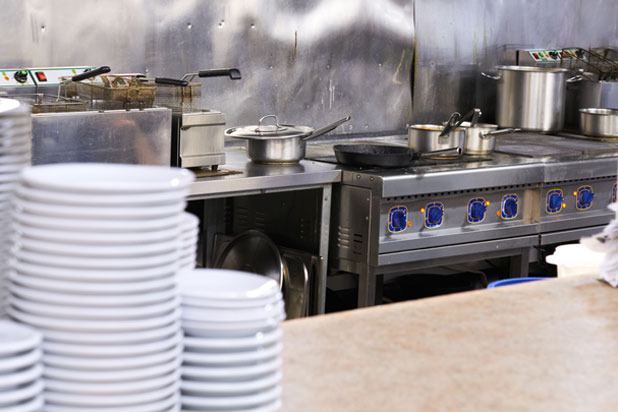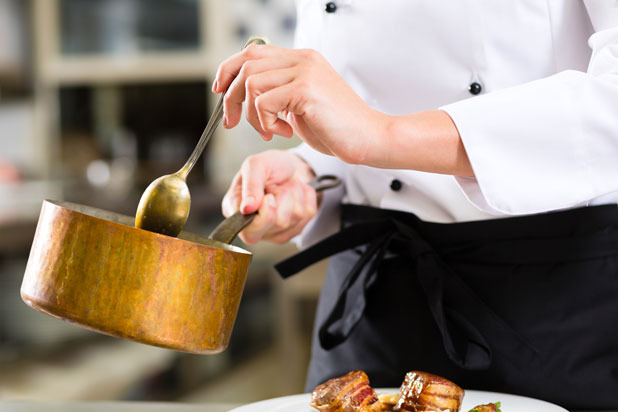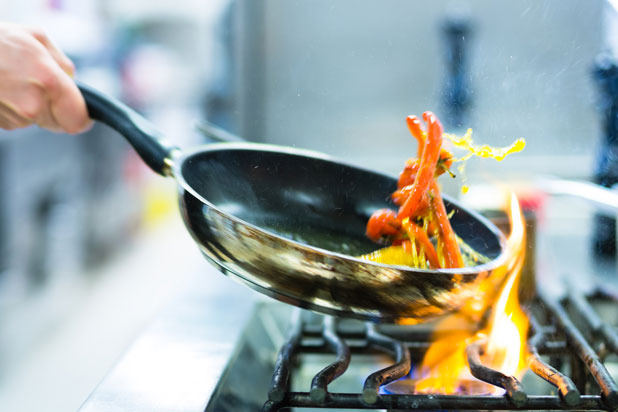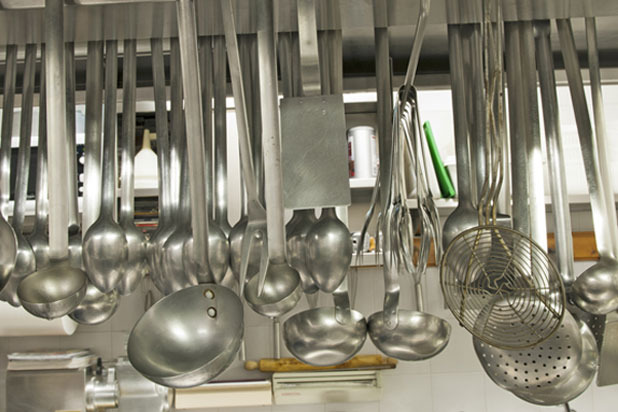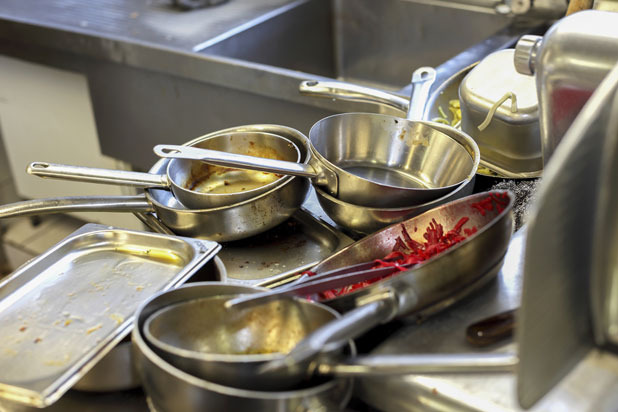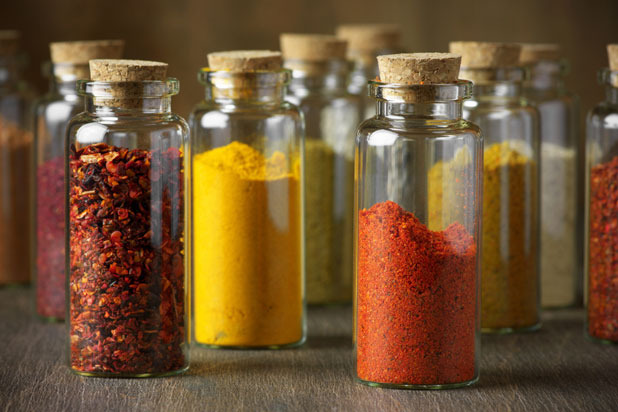Reasons Why Restaurant Kitchens Are Better Than Yours (Slideshow)
Reasons Why Restaurant Kitchens are Better than Yours
For home cooks, trying to prepare a meal that looks like it came out of a restaurant kitchen can be an exercise in futility. This isn't because restaurant chefs went to cooking school and home cooks didn't, or because of the presentation. The reason is that restaurant kitchens are completely different than home kitchens. Different and much better equipped.
They Have a Salamander
A salamander (some cooks call it a "sally" for short) is essentially a high-powered industrial broiler, and it's one of the most important tools in a restaurant kitchen with no real counterpart in home kitchens. What makes salamanders different from oven broilers? Well, they get ripping hot, and because food is able to be placed just inches from the heat source, it browns perfectly in seconds. Essential for making everything from melted cheese to seared steaks, the salamander is a vital and standard component of restaurant kitchens.
The Knives are Sharper
Dull knives don't just cut food poorly; they're also a lot more dangerous, because 'they're more likely to slip while you're cutting, which could leave you in major trouble. When was the last time you sent your knives out to be professionally sharpened? Most restaurants have their knives sharpened at least once a week.
The Ovens are More Accurate
Hate to break it to you, but the temperature reading on your oven most likely isn't entirely accurate. This is because it's only turned on when it's being used, as opposed to being left on all day long, as it is in restaurant kitchens. A hot oven, set to the true temperature needed, is a cook's best friend.
Butter, Shallots, Stock, and Salt
The reason behind that perfect sear on those scallops? Butter. The reason behind that creamy, glistening sauce? Butter. A whole lot more butter is used in restaurant kitchens than you might imagine, as well as shallots (which add a subtle onion/ garlic flavor), stock (which boosts the umami richness of everything it comes across), and salt (which is used liberally, especially when it comes to seasoning meat). This is an effect you can recreate at home by adjusting your use of these ingredients; just go easy on the extra butter, or you'll eliminate one of the main benefits of cooking at home.
Deep-Fryers
If you have a deep-fryer at home, it's most likely one of those countertop models that don't hold very much oil. It's also more difficult to bring up to and maintain the temperature in countertop fryers, resulting in greasy, flaccid fried food. Professional deep-fryers are always at the right temperature and can hold a whole lot more food than the home version, resulting in a perfect fry every time.
They Can Afford to Throw Food Away
Yes, restaurants occasionally screw up a dish. Something will burn, or it will be too salty, or a component will accidentally be left out. But instead of just serving it anyway, a good restaurant will throw it out and start all over, because everything that leaves the kitchen needs to be perfect. While most home cooks have to grin and bear it when that chicken dish accidentally gets a bit overcooked because they can't afford (either time- or money-wise) to redo it, restaurant kitchen can't afford not to redo it—their reputation depends on getting the dish right.
The Pans are Seasoned
When a pan is used every single day, all day, for years, it develops a certain patina, or "seasoning," that greatly improves the end result of whatever's cooked on it. Good cast-iron pans at home can become well seasoned it used often enough and not washed with soap, but nothing compares to a battle-tested restaurant pan.
Every Tool is the Right One
Ever try to use a spatula when you really needed a pair of tongs? Ever have something stick to the pan so badly that it was beyond repair and find yourself saying "My kingdom for a Silpat!"? In professional kitchens, every tool is the right one for the job. Pots and pans are exactly the size they need to be, knives are perfectly suited for what needs to be cut, and all the other little devices and contraptions, from immersion blenders to mandolines, make kitchen workers turn out food that's more precise.
There’s Prep and Cleanup Staff
At home, there's usually one person (maybe two) who does all the preparation, cooking, plating, and cleaning. In restaurants, a prep team is working throughout the day to make sure that sauces are seasoned, stocks are hot, onions are diced, green beans are blanched, and everything else that needs to go into a dish is ready. Eggs are even pre-poached before brunch rushes and then re-heated in a water bath to order. There's also a dishwasher who makes sure that no dirty dishes are sitting around. Each cook is able to focus on the task at hand, which is making sure that every dish that leaves the kitchen is perfect.
They Have Ingredient Access
Unless you happen to be lucky enough to live near a world-class butcher or seafood shop, you're most likely not buying ingredients of the same quality as those that make their way to upscale restaurants. Other ingredients that can be crucial to a dish, like veal demi-glace or sweetbreads, are also not exactly found in every home cook's pantry.
